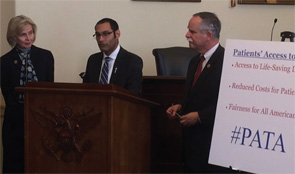
Will Harvey, MD, MSc, ACR Government Affairs chair, joins
Rep. David McKinley (R-W.Va.), right, and Lois Capps (D-Calif.), left, at the PATA reintroduction on March 25, 2015.
Rheumatologists and rheumatology health professionals make a difference every day in the lives of patients. And through the work of many devoted members, the College takes that commitment beyond the care setting and into the policy arena to Advance Rheumatology! on Capitol Hill and in state capitols across the country.
I want to take a moment to highlight a few of our advocacy initiatives and then make a personal request of you. ACR advocacy is driven by improving access to care, including access to rheumatologists, access to the best treatments and access to breakthrough discoveries through medical research.
Ensuring Patients Can See a Rheumatologist
We can improve the lives of our patients by first ensuring rheumatology practices can be managed efficiently and sustained financially. Two advocacy issues bearing on this subject at the moment relate to the status of Medicare payments and ICD-10 implementation.
SGR
We have long sought relief from the Sustainable Growth Rate (SGR) payment formula. Since 2003, Congress has had to repeatedly block drastic cuts in payments. For many years, we have discussed this issue with lawmakers, and over the past several years, the ACR has been asked to weigh in more than a dozen times on various iterations and details of proposed legislation.

SGR
It’s gratifying to write that in March, the U.S. House passed SGR repeal by a vote of 392 to 37, an astonishing bipartisan margin. The Senate followed suit in April, voting 92–8 for passage, and the president signed the bill into law. Ending the SGR once and for all was an historic and long-overdue policy victory for all of medicine and our patients. We can now move forward without the burden of uncertainty about the future of physician payments.
Here are some details about the passed legislation, now law. The SGR repeal bill, H.R. 2, does the following:
- Finally repeals the SGR, averting the 21.2% cut in payments for 2015;
- Implements a 0.5% positive payment update for five years beginning this June;
- Sunsets PQRS, Value-Based Modifier and Meaningful Use programs in 2018 and establishes a single quality reporting and payment system (Merit-Based Incentive Payment System, MIPS);
- Preserves fee for service as an option;
- Provides bonuses above the baseline update if providers score well in MIPS categories; all physicians may qualify for bonuses;
- Pays bonuses if providers participate in an Alternative Payment Model (APM);
- Allows the ACR a voice in quality metrics and promotes registry use;
- Provides financial support for small practices to develop new models or participate in MIPS; and
- Links payments to meeting thresholds rather than a competition model.
The MIPS will reorganize current pay-for-performance plans into a single entity, beginning in 2019. The status quo will continue through 2018, without the threats of SGR cuts and with a slight positive payment update. Many of the details of MIPS are a work in progress, but we will have opportunities to influence its implementation.
The bill also ensures physician societies will have a say in quality metrics. The ACR will continue expanding its quality initiatives and will work with Congress and CMS to ensure appropriate quality measures are available for rheumatologists to use in their practices.
Ending the SGR [means] we can now move forward without the burden of uncertainty about the future of physician payments.
Although the bill was not perfect, it was far better than the status quo. And the bill was much better than previous proposals, which would have called for double-digit cuts if a physician did not move to an APM, locked in 0% baseline updates for years and pitted physicians against each other in competition for bonuses. We had asked to tie updates to the Medical Economic Index and had argued for an update of at least 2% higher than the baseline for those providers who primarily provide evaluation and management (E&M) services. Although the ACR would have liked to have seen higher updates, payment “bumps” based on E&M care may be feasible in the future.
You can count on the ACR to help members prepare for the new payment and reporting system that will be coming in 2019. We will help members identify ways they may need to modify practices to ensure appropriate reimbursement and how you can best prepare to deliver value-based care.
ICD-10
The implementation of ICD-10 remains among the most challenging issues for our members. Many rheumatology practices have been unable to obtain the recommended credit lines for six months of expenses if claims are delayed or not paid correctly. There is also the burden of the additional administrative and financial costs of implementation.
The ACR was on the Hill talking about ICD-10 when it was last delayed. We now have indications from Congressional leaders of both parties that ICD-10 will move forward on Oct. 1, 2015. Therefore, the ACR is taking a lead role among medical societies to minimize its effects.
The ACR has drafted legislation that mitigates the impacts of ICD-10, which has met with positive support from Hill offices and other physician societies. The bill stipulates the following:
- CMS must conduct full end-to-end testing prior to implementation, available to all providers;
- CMS must certify to Congress that the system is fully functioning;
- An 18-month implementation period during which physicians are held harmless for errors in coding specificity; claims may not be rejected due to specificity; applies to all payers;
- Physicians cannot be charged under the False Claims Act due to coding specificity; and
- CMS must provide feedback to providers regarding incorrect codes that are submitted.
Giving Patients Access to Breakthrough Treatments
We have each witnessed dramatic improvements in patient care with the introduction of biologics and other novel therapies. Patients with chronic rheumatologic diseases need access to these effective therapies to enable daily functioning and pursuit of their livelihoods. But these innovative medications are very expensive, often costing more than $20,000 per year. When insurers demand excessive cost sharing for these medications, it leaves the average American without access to affordable beneficial treatment.
Excessive Patient Cost Sharing
Insurance companies often include biologics and other novel therapies in a specialty tier, which requires substantial patient cost sharing. To remove these discriminatory barriers, the ACR has worked with the Arthritis Foundation to form the Coalition for Accessible Treatments. This coalition, which now includes 32 active members, has advanced the Patients’ Access to Treatment Act (PATA).
PATA (H.R. 1600), crafted by the ACR, limits specialty drug cost sharing (Tier IV and higher) to the plan’s level of cost sharing for non-preferred brand drugs (Tier III). The ACR was on hand and had a featured role in the reintroduction of PATA on March 25 by Rep. David McKinley (R-W.Va.) and Rep. Lois Capps (D-Calif.). Working with coalition partners, we had signed up 50 co-sponsors at the time of introduction, with the goal of getting more than 140 co-sponsors on board. We are now working to put forward a comparable bill in the Senate.
Making the Next Big Discoveries Possible
We must also ensure the discovery of the next breakthrough treatments through a robust portfolio of basic and clinical research. Despite unprecedented scientific opportunities, investigators face an enormously challenging funding environment. The NIH once funded one in three grant proposals, but now funds only one in six. We are not only leaving many innovative projects in the drawer, but are also putting ourselves at risk of losing this generation of young scientists because of the uncertain funding climate.
The ACR supports an NIH funding level of at least $32 billion in FY 2016. We have joined other supporters of medical research in advocating for this level of funding and will continue to work with appropriators in the House and Senate to achieve funding that keeps pace with needs and biomedical inflation. The ACR is also working to advance legislation that would allow NIH funding to surpass caps put in place by the Budget Control Act, as well as bills that would provide for more sustainable funding outside of the annual appropriations process.
Although I have mentioned only a few of the major advocacy initiatives, the Government Affairs Committee has, in fact, identified more than two dozen major issues affecting rheumatology practices and our patients. Sequester cuts, biosimilars, step therapy, complex chemotherapy codes, more appropriate reimbursement of rheumatologists’ care, pediatric access and many other issues are also areas in which the ACR is advocating at the federal and state levels. The ACR Insurance Subcommittee and the Practice Advocacy division are also actively working with insurers on your behalf.
So now I would like to make that personal request of you. I am asking you to sign up to be an ACR Key Contact.
The Power of Personal Relationships
This month, the ACR Board of Directors, along with members of the Government Affairs Committee and RheumPAC Committee, and representatives of state rheumatology societies, will be in Washington, D.C., speaking with our representatives in Congress. Although these meetings are important, it’s perhaps even more critical to our causes for you to become involved in advocacy at home.
I can recall many examples in which a personal relationship between an ACR member and their lawmaker has enabled us to advance our cause. Indeed, a key principle for effective advocacy is a willingness to develop a relationship with your elected officials. Nothing motivates representatives like their constituents.
To this point, the ACR is enhancing advocacy efforts by launching a Key Contact Program for our members to serve as liaisons to elected and appointed officials. Our success on Capitol Hill and in state legislatures is dependent on personal relationships and our ability to effectively communicate with government officials. Whether you already have a relationship with elected officials or would like to develop a relationship with your senator, representative or insurance commissioner, the ACR will provide the support to cultivate that relationship. Key Contacts are asked to be involved in at least three advocacy efforts yearly. These opportunities include sending letters, sending e-mails or making calls to elected officials, attending local events and participating in issue calls.
Visit the ACR Advocacy page to learn more, e-mail [email protected] or call advocacy staff at 404-633-3777 to express your interest in being a Key Contact.
Thank you to all members of the ACR and ARHP who devote a portion of their time each month to helping Advance Rheumatology! in Washington, D.C., and across the U.S. My hat is off to all of you. Please know that your personal efforts truly make a difference.
I look forward to continuing work with you as together we continue to Advance Rheumatology!
 E. William St.Clair, MD, is president of the ACR and chief of the Duke Division of Rheumatology and Immunology. Dr. St.Clair, a rheumatologist, has 25 years of experience as a clinical investigator. Contact him at [email protected].
E. William St.Clair, MD, is president of the ACR and chief of the Duke Division of Rheumatology and Immunology. Dr. St.Clair, a rheumatologist, has 25 years of experience as a clinical investigator. Contact him at [email protected].
